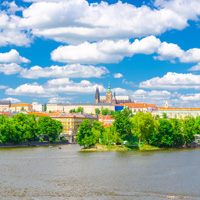10 Things to Know Before Moving to Czechia
Summary: If you're planning a move to Czechia, here are 10 things expats living there wish they had known before moving to Czechia.
Welcome to the heart of Europe, where the allure of ancient castles, stunning landscapes, and a rich cultural tapestry beckons. If you're considering joining the ranks of expats in Czechia, there's much to look forward to. However, as with any international move, it's essential to go in with eyes wide open. Here are ten crucial insights to help you navigate the transition smoothly and start your new life in Czechia on the right foot.
1. Embrace the Czech Language
While many Czechs speak English, especially in larger cities like Prague and Brno, learning the Czech language will significantly enhance your experience. It's a Slavic tongue known for its complexity and beauty, and even basic proficiency can open doors, both socially and professionally. Language courses are widely available, and locals generally appreciate the effort, often showing patience and encouragement to learners. Remember the first time you correctly order a "pivo" (beer) in a local "hospoda" (pub) – it's a small victory that will feel like a rite of passage.
2. Understand the Visa Requirements
Before packing your bags, make sure you're clear on the visa and residency requirements. EU citizens can move to Czechia with relative ease, but if you're from outside the EU, you'll need to navigate a more complex process. Long-term visas, employee cards, and business licenses come with specific conditions and paperwork. Reach out to the Czech embassy in your home country or consult with an immigration lawyer to ensure you have the correct documentation in place before your move.
3. Get Ready for a Continental Climate
Czechia experiences a continental climate, which means hot summers and cold, snowy winters. If you're coming from a milder climate, prepare for temperature extremes. In winter, temperatures can drop well below freezing, so invest in a good-quality coat, boots, and thermal wear. Conversely, summer can bring heatwaves, so lightweight clothing and a fan for your accommodation are wise purchases. The changing seasons also offer a variety of outdoor activities, from skiing in the Krkonoše Mountains to summer festivals in the city parks.
4. Healthcare is High Quality but Know the System
The Czech healthcare system is known for its high standard of care. As an expat, you'll need to register for public health insurance or secure a private policy. EU citizens can use their European Health Insurance Card (EHIC) for initial coverage but should register for local insurance for long-term stays. Non-EU expats typically need proof of health insurance for their visa applications. Familiarize yourself with the local clinics and hospitals, and don't hesitate to ask fellow expats for recommendations on English-speaking doctors.
5. Public Transport is Efficient and Reliable
Czechia boasts an excellent public transportation system, particularly in Prague. Buses, trams, and trains are punctual, clean, and affordable. Owning a car is not a necessity, especially if you live in the city. The integrated transport systems allow you to travel seamlessly across the country, and various ticket options cater to different needs, including short-term and long-term passes. Don't forget to validate your ticket to avoid fines, and enjoy the scenery as you travel – Czechia's landscapes are a treat from the windows of public transport.
6. The Cost of Living Can Vary
The cost of living in Czechia is generally reasonable, but it can vary significantly between the city and the countryside. Prague, as the capital, is the most expensive city, particularly when it comes to rent. However, even within Prague, costs can vary by district. Shopping at local markets and cooking at home can save money, as can taking advantage of the many free cultural events throughout the year. Plan your budget accordingly, and consider living slightly outside the city center for more affordable housing options.
7. Czech Cuisine is Hearty and Diverse
Czech cuisine is a hearty affair, with dishes like "sví?ková" (marinated beef with a creamy sauce) and "knedlíky" (dumplings) taking center stage. While meat features prominently, there are also plenty of soups, stews, and baked goods to enjoy. Czech beer is world-renowned, and you'll find a variety of local brews in pubs across the country. Vegetarians and vegans may need to search a bit harder for suitable dining options, but the scene is growing, especially in larger cities.
8. Embrace Local Traditions and Holidays
Czechia is rich in traditions and holidays, which are celebrated with enthusiasm. From the Christmas markets and Easter festivities to the burning of the witches on April 30th, there's always something to experience. Participating in these events can provide a deeper understanding of Czech culture and history, and it's a fantastic way to meet people and make friends. Don't be surprised if you're invited to a "chata" (country house) for a weekend of mushroom picking – it's a beloved Czech pastime!
9. The Expat Community is Thriving
While integrating into Czech society is important, the expat community can be a valuable support network. There are numerous expat groups, clubs, and online forums where you can seek advice, find language exchange partners, and learn about job opportunities. These communities often organize social events, which can be a lifeline when you're feeling homesick or overwhelmed by the challenges of expat life.
10. Be Prepared for Bureaucracy
One aspect of life in Czechia that often takes expats by surprise is the level of bureaucracy. From registering your address to setting up utilities, there can be a lot of paperwork involved. Patience is key, as is keeping copies of all your important documents. It can be helpful to bring a Czech-speaking friend or hire a translator for more complex interactions. Over time, you'll learn to navigate the system, and the initial hassle will become a distant memory as you settle into your new life.
Moving to Czechia is an adventure filled with opportunities to grow, learn, and explore. By keeping these ten tips in mind, you'll be well on your way to a successful and fulfilling expat experience. Welcome to your new home!
About the Author
 Joshua Wood, LPC joined Expat Exchange in 2000 and serves as one of its Co-Presidents. He is also one of the Founders of Digital Nomad Exchange. Prior to Expat Exchange, Joshua worked for NBC Cable (MSNBC and CNBC
Primetime). Joshua has a BA from Syracuse and a Master's in Clinical and Counseling Psychology from Fairleigh Dickinson University. Mr. Wood is also a licensed counselor and psychotherapist.
Joshua Wood, LPC joined Expat Exchange in 2000 and serves as one of its Co-Presidents. He is also one of the Founders of Digital Nomad Exchange. Prior to Expat Exchange, Joshua worked for NBC Cable (MSNBC and CNBC
Primetime). Joshua has a BA from Syracuse and a Master's in Clinical and Counseling Psychology from Fairleigh Dickinson University. Mr. Wood is also a licensed counselor and psychotherapist.
Some of Joshua's articles include Pros and Cons of Living in Portugal, 10 Best Places to Live in Ireland and Pros and Cons of Living in Uruguay. Connect with Joshua on LinkedIn.
Additional Information:
- Czech Rep Guide
- Healthcare & Health Insurance in Czech Rep
- Members Talk about Healthcare & Health Insurance in Czech Rep
- Best Places to Live in Czech Rep
- Real Estate in Czech Rep
- Guide to Real Estate in Czech Rep
- Pros & Cons of Living in Czech Rep
- Cost of Living in Czech Rep
- Is Health Insurance Required When Moving to Czechia?
- Best Places to Ski in Czechia
- Having a Baby in Czechia
- Health Insurance in Czechia
- Pros and Cons of Living in Czech Rep 2025
- 2025 Guide to Moving to Czech Rep




